Fathers of Science
by Dr. Matthew Bunson
Filed under Christianity and Science
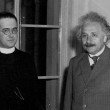
On March 12, 2008, the John Templeton Foundation made the announcement of the winner of its annual Templeton Prize, which honors achievements engaging the great questions of life and the universe. The $1.6 million prize for 2008 went to Michał Heller, a Polish cosmologist and professor in the faculty of philosophy at the Pontifical Academy of Theology in Cracow, Poland. What makes Heller additionally remarkable is that he is a Catholic priest. The 72-year-old planned to spend the prize... Read More
The Opening of the Scientific Mind
by Dr. Stacy Trasancos
Filed under Science

David Gelernter wrote an evocative essay for Commentary Magazine (cleverly) titled "The Closing of the Scientific Mind." His essay was a summary of conflicts in modern "philosophy of mind." He criticized the "bullying" against atheist Thomas Nagel who concluded that Darwinian evolution is insufficient to explain consciousness and who was "unwilling" in Gelernter's opinion "to express sufficient hatred of religion to satisfy other atheists." Then Gelernter discussed the "roboticism" of... Read More
Recommended Books
by Brandon Vogt
Filed under
Below you'll find our favorite books in several categories. We especially recommend the titles listed in bold. God How to Think About God: A Guide for the 20th Century Pagan by Mortimer Adler On Being and Essence (De Ente Et Essentia) by Thomas Aquinas The One and the Many: A Contemporary Thomistic Metaphysics by W. Norris Clarke Blackwell Companion to Natural Theology edited by William Lane Craig God: A Debate Between a Christian and an Atheist by William Lane Craig and Walter Sinnott-Armstrong An... Read More
10 Keys on Faith and Science for Christians and Atheists
by Dr. Stacy Trasancos
Filed under Christianity and Science

On one hand, there are marvelous discourses in institutions of higher learning about the ways theology illuminates scientific ideas and, likewise, how science deepens faith. Theologians, philosophers, and scientists come together and talk, even if everyone is not a person of faith. On the other hand, the public presentation of faith and science, mostly on the internet, is a tale of incessant conflict because anyone can pose as an expert on religion or science, despite being nonreligious... Read More
The Stillbirth of Science in Arabia
by Dr. Stacy Trasancos
Filed under Christianity and Science
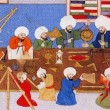
NOTE: Today we wrap up our weekly series of essays by Dr. Stacy Trasancos on the "stillbirths" of science. They're based on Fr. Stanley L. Jaki's research into the theological history of science in the ancient cultures of Egypt, China, India, Babylon, Greece, and Arabia. See past articles here. The last culture to be examined is that of the Muslims. Although theirs was a monotheistic view, it was not a Christological or Trinitarian view, which left it vulnerable to a monotheism... Read More
The Stillbirth of Science in Greece
by Dr. Stacy Trasancos
Filed under Christianity and Science

NOTE: Today we continue our weekly series of essays by Dr. Stacy Trasancos on the "stillbirths" of science. They're based on Fr. Stanley L. Jaki's research into the theological history of science in the ancient cultures of Egypt, China, India, Babylon, Greece, and Arabia. See past articles here. Like other great civilizations, the contributions and skill of the ancient Greeks cannot be dismissed. Probably more has been written about Greek intellectual history than any other ancient... Read More
The Stillbirth of Science in Babylon
by Dr. Stacy Trasancos
Filed under Christianity and Science
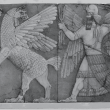
NOTE: Today we continue our weekly series of essays by Dr. Stacy Trasancos on the "stillbirths" of science. They're based on Fr. Stanley L. Jaki's research into the theological history of science in the ancient cultures of Egypt, China, India, Babylon, Greece, and Arabia. See past articles here. In The Savior of Science, Jaki mentioned the history of science among cultures that communicated and developed in succession–Babylon, Greece, and Arabia. Knowledge was transmitted to... Read More
The Stillbirth of Science in India
by Dr. Stacy Trasancos
Filed under Christianity and Science
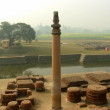
NOTE: Today we continue our weekly series of essays by Dr. Stacy Trasancos on the "stillbirths" of science. They're based on Fr. Stanley L. Jaki's research into the theological history of science in the ancient cultures of Egypt, China, India, Babylon, Greece, and Arabia. See past articles here. The decimal system and notation developed in ancient India between the fourth and seventh centuries represents “the most noteworthy single contribution of ancient India to science and... Read More
The Stillbirth of Science in China
by Dr. Stacy Trasancos
Filed under Christianity and Science

NOTE: Today we're continuing our weekly series of essays by Dr. Stacy Trasancos on the "stillbirths" of science. They're based on Fr. Stanley L. Jaki's research into the theological history of science in the ancient cultures of Egypt, China, India, Babylon, Greece, and Arabia. See past articles here. There is so much written about China’s rich and illustrious past that no case could ever be made—from the Shang Dynasty (1523–1028 B.C.) to the Ch’ing Dynasty (A.D. 1644–1912)—that... Read More
The Stillbirth of Science in Ancient Egypt
by Dr. Stacy Trasancos
Filed under Christianity and Science
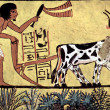
NOTE: For the next six Fridays, Strange Notions will present a series of essays by Dr. Stacy Trasancos on the "stillbirths" of science. They're based on Fr. Stanley L. Jaki's research into the theological history of science in the ancient cultures of Egypt, China, India, Babylon, Greece, and Arabia. The first stillbirth Fr. Stanley L. Jaki discussed in the Savior of Science is the stillbirth of science in Egypt, “an Egypt to be buried in the sand.” In ancient Egypt (from about... Read More






